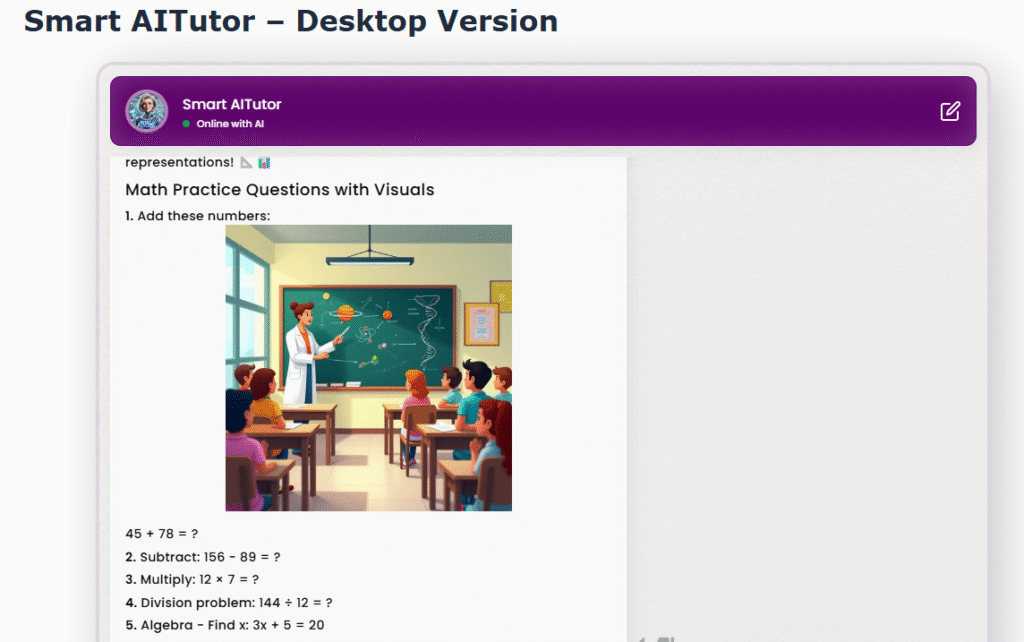Studying is not just about spending endless hours with your books open. It’s about learning smarter, not harder. Many students put in the effort, but because they don’t use the right techniques, they end up feeling frustrated and overwhelmed. The good news is that effective studying is a skill you can learn — and with the right strategies, you can improve your memory, manage your time better, and perform at your best.
In this guide, we’ll explore 10 proven tips you can follow now to help you study effectively as a student. These methods are simple, practical, and backed by research. Along the way, we’ll also highlight tools like Smart AITutor that can support your learning journey.

Why Effective Study is Important
Learning isn’t just about reading notes or trying to memorize everything. It’s about truly understanding and keeping information so you can use it when needed. When you know how to learn effectively as a student, schoolwork feels easier, and you can achieve better results without stress and disappointment. Here are 10 tips to follow to learn effectively as a student.
1. Set Clear Study Goals
Before you even pick up your book, ask yourself: What do I want to achieve in this study session? Goals give direction and help you stay focused. For example, instead of saying, “I’ll study Biology today,” say, “I’ll complete two chapters of Biology and summarize the key points.” Clear goals prevent procrastination and make it easier to track progress.
When you set a goal, you will plan to achieve it. A good study plan is the first step to learn effectively as a student. Instead of waiting until just before exams, plan your study time each week.
Planning helps you stay on track and avoid last-minute cramming. You can talk to your parents or guardian about getting you automated goal-setting software to help you plan smarter and study better. Both students and workers can use this kind of tool to stay organized and reach their goals more easily.

2. Create a Study Schedule
Consistency is key. Instead of cramming the night before exams, spread out your learning over weeks. A study timetable helps you stay on track and ensures you don’t leave out important topics. For instance, you can dedicate mornings to subjects that require deep focus (like Mathematics) and evenings for lighter reading (like History). A well-structured schedule reduces stress and boosts confidence.
Here are some tips:
- Use a calendar or planner
- Set a specific time for each subject
- Break study sessions into 30–45 minute blocks
3. Choose the Right Study Environment
Your environment can either improve or ruin your focus. Find a quiet, organized space with minimal distractions. If you’re at home, keep your desk clutter-free and avoid studying in bed — it signals rest, not work. Some students find background music helpful, while others prefer silence. Test both and stick with what works best for you.
A quiet, clean space helps you learn effectively as a student. Choose a spot where you can focus without distractions. Study away from:
- Loud music
- TV
- Phones or social media (unless you’re using it to study)
A quiet environment helps your brain stay focused and calm.
4. Use Active Learning Techniques
Passive reading rarely works. Instead, engage with the material. This could mean summarizing in your own words, teaching the concept to a friend, or creating flashcards. For example, if you’re learning vocabulary in a new language, practice by using the words in real sentences. Active learning forces your brain to process and retain information more deeply. Here are our easy techniques you can apply:
- Summarize what you read in your own words
- Use flashcards for key terms
- Teach someone else what you just learned
- Draw diagrams or mind maps to connect ideas
These methods help you understand better and remember longer.
5. Apply the Pomodoro Technique
The brain struggles with long periods of concentration. The Pomodoro Technique — studying in 25-minute focused sessions followed by a 5-minute break — helps maintain energy and focus. After four sessions, take a longer break (15–30 minutes). This method prevents burnout and keeps your mind fresh.
Always remember, if you want to learn effectively, don’t study for hours without resting. This keeps your mind fresh. During your break, you can:
- Stretch or walk
- Drink water
- Close your eyes and relax
Breaks help your brain recharge so you can continue with fresh energy.
6. Take Smart Notes
Good notes are more than just copying what’s in the textbook. Use methods like the Cornell system, mind maps, or bullet points. For instance, if you’re studying Economics, write down definitions in one column, key examples in another, and summary notes at the bottom. Smart notes help with quick revision and deeper understanding.
If something is hard to understand, ask for help. Talk to your teacher, a classmate, or search for simple videos or articles online. Don’t be shy. Everyone needs help sometimes.
7. Test Yourself Regularly
Quizzing yourself is one of the most effective study methods. It strengthens memory and reveals areas that need improvement. For example, after studying a chapter, close your book and write down everything you remember. Then check your accuracy. Tools like Smart AITutor can even generate practice questions tailored to your subject.

You may do the following:
- Write down key points from memory
- Quiz yourself using past questions
- Join a study group to share ideas
This helps you check what you really know and what you need to review again.
8. Stay Healthy: Sleep, Diet, and Exercise

Your brain is part of your body, and it works best when you take care of yourself. Lack of sleep affects concentration and memory. Aim for at least 7–8 hours of sleep daily. Eat brain-boosting foods like nuts, fruits, and fish, and avoid too much sugar or caffeine. Even light exercise, like a 20-minute walk, improves focus and reduces stress.
9. Form or Join Study Groups
Studying with peers can be powerful positive force when done right. Explaining concepts to others strengthens your own understanding. For example, if your group is revising Chemistry, one person can teach a chapter while others ask questions. But remember: choose serious, committed peers to avoid turning study time into social time.
10. Use Technology and Smart Tools
In today’s world, technology can make studying easier and more engaging. Apps like Quizlet, Google Keep, and Smart AITutor are excellent companions. Smart AITutor, for example, can explain difficult concepts, quiz you instantly, and even suggest personalized study plans. Instead of studying alone, you can have an intelligent tutor available 24/7.
What makes the Smart AITutor special is that it gives you answers that match your level. If you’re a beginner seeking to learn effectively, the AI tool keeps things easy to understand. If you’re more advanced, it gives you deeper explanations and useful challenges. Whether you’re preparing for a test or just trying to remember what you learned in class, the Smart AITutor can walk you through it step by step. This makes it a powerful tool for any student who wants to get better at studying and learning the smart way.
Final Thoughts
Studying effectively is not about the number of hours you spend with your books open — it’s about how you use that time. By setting clear goals, creating a routine, using active learning, and taking care of your health, you can transform your study habits. Adding smart tools like Smart AITutor will give you an extra edge, making learning both efficient and enjoyable.
FAQs
1. How many hours should a student study each day?
There’s no one-size-fits-all answer, but most students find that 2–4 focused hours daily (using techniques like Pomodoro) is more effective than 8–10 hours of passive reading.
2. Is group study better than self-study?
Both have benefits. Group study is great for discussion and explaining concepts, while self-study allows for deeper concentration. Combining both methods works best.
3. Can technology really help me study better?
Yes. Smart tools like Smart AITutor provide personalized learning, instant feedback, and practice quizzes that make studying more effective than traditional methods alone.
4. What is the best way to remember what I study?
Active recall and spaced repetition are proven methods. This means regularly testing yourself and revisiting topics at increasing intervals.
5. How can I avoid procrastination while studying?
Break big tasks into smaller ones, set specific goals, and use time management techniques like Pomodoro. Also, eliminate distractions — put your phone on silent or study away from social media.
To succeed in your study and to be effective, take one step at a time, be patient with yourself, and remember: every big result begins with small daily actions of progressive study.
Test your knowledge here



